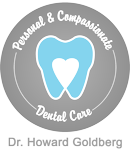Bridges & Implants
Bridges vs. Implants: Which One Is Right for You?
There are many options for replacing missing teeth. When you don’t want the hassle of a removable prosthetic, such as a denture or partial, you are left with two fixed restoration solutions: bridges and implants. Both offer different benefits and indications, and there may be several personal and oral health factors to consider when determining which one is right for you.
Bridge
A dental bridge is a fixed prosthetic that uses fake teeth (called pontics) anchored to two teeth on either side of the bridge (called abutments). The anchor teeth must be prepared and crowned in order for the bridge to be secured into place. Once placed, a bridge is permanently cemented into place and non-removable. In the past, bridges were the best possible solution for filling in the gaps where missing teeth once were. However, they are not as long-lasting as dental implants are, and they also put the abutment teeth at risk of plaque accumulation, decay, and infection since maintenance of proper hygiene is tougher since all the teeth are connected. Bridges can also increase the risk of periodontal disease near the anchor teeth. Typically, if one tooth of a bridge is affected by disease, the whole bridge becomes affected.
Implants
Implants are the preferred method of tooth replacement, offering superior aesthetics, long-lasting wear, and high functionality. An implant is a titanium root substitute placed directly under the gums in place of a former tooth. The implant integrates with the bone, creating a permanent bond. Eventually, a crown can be added to an implant abutment that is permanently fixed, creating a natural-looking restoration that is as close to a natural tooth in strength and appearance as possible.
The Takeaway…
Though bridges may seem like a more economical decision to replace a tooth at first, they often lead to other complications down the road by compromising teeth that otherwise wouldn’t have been affected if an implant had been the original choice. Unless your tooth loss occurred many years ago and you do not have sufficient bone left in your jaw, implants are almost always the ideal solution for replacing missing teeth. Even then, you might be a candidate for a bone graft procedure that would allow you to be a candidate for implants in the future.
Implant wearers can expect to enjoy decades of wear without dietary restrictions, and the implant will ultimately provide superior aesthetics since the final restoration can be made to look identical to a natural tooth.
Though you can educate yourself on the benefits of both types of restorations, only you and your dentist can determine which one would best fit your needs. Contact our office to schedule a consultation and find out whether a fixed bridge or implant could be right for you.
Please watch this video to help illustrate some of the differences between a bridge and an implant as well as some of the advantages of disadvantages of both treatment options.












